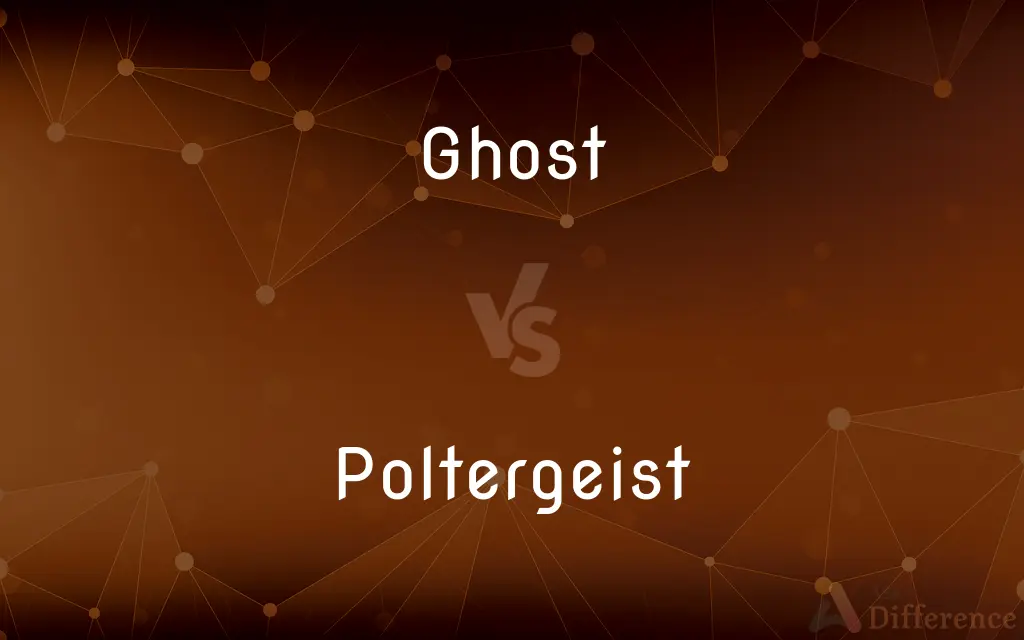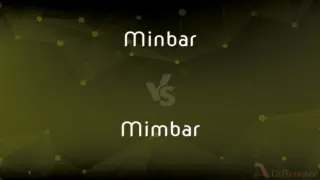Ghost vs. Poltergeist — What's the Difference?
By Tayyaba Rehman — Updated on October 27, 2023
A ghost is an apparition of a deceased person, while a poltergeist is a ghost known for causing physical disturbances.

Difference Between Ghost and Poltergeist
Table of Contents
ADVERTISEMENT
Key Differences
Ghosts are generally seen as the spirits or souls of deceased individuals. They are often depicted as ethereal and translucent. Poltergeists, on the other hand, are a specific type of ghost known for physical disturbances, like moving objects or making loud noises. They are less about visual appearance and more about tangible effects.
The term ghost is used broadly in paranormal contexts to refer to any spirit of the dead. It has a wide range of connotations, from frightening to benevolent. Poltergeist is a more specific term, derived from German words meaning "noisy ghost." It's associated primarily with mischievous or disruptive behavior.
In many cultures, ghosts are believed to appear to relay messages or complete unfinished business. They are often linked with particular locations or objects. Poltergeists are sometimes thought to be manifestations of intense emotional energy, not necessarily tied to specific spirits of the deceased.
Ghosts are a common theme in folklore, literature, and film, depicted in various ways from scary to friendly. They often symbolize unresolved issues or the past haunting the present. Poltergeists, while also present in media, are specifically portrayed as causing chaos, such as throwing items or slamming doors.
In some beliefs, ghosts can be peaceful or even protective spirits. They might appear as familiar figures to the living. Poltergeists are rarely seen as benevolent; they are typically associated with fear and are often linked to specific locations, like a haunted house.
ADVERTISEMENT
Comparison Chart
Definition
Apparition of a deceased person
Ghost known for physical disturbances
Appearance
Often ethereal and translucent
Less visual, known for tangible effects
Behavior
Can be benevolent or malevolent
Primarily mischievous or disruptive
Cultural Role
Often appear with messages or unresolved issues
Associated with emotional energy, causing chaos
Perception
Can be protective or haunting
Rarely seen as benevolent, induces fear
Compare with Definitions
Ghost
Spirit of a deceased person
The old mansion is said to be haunted by the ghost of its original owner.
Poltergeist
Manifestation of intense emotions
The poltergeist activity was linked to the turbulent emotions of the teenager.
Ghost
Trace or semblance
He moved like a ghost through the empty streets.
Poltergeist
Energetic spirit causing chaos
A poltergeist was said to cause the unexplained slamming of doors.
Ghost
In folklore, a ghost is the soul or spirit of a dead person or animal that can appear to the living. In ghostlore, descriptions of ghosts vary widely from an invisible presence to translucent or barely visible wispy shapes, to realistic, lifelike forms.
Poltergeist
Noisy, disruptive ghost
The family believed a poltergeist was responsible for the strange noises at night.
Ghost
An apparition of a dead person which is believed to appear or become manifest to the living, typically as a nebulous image
A ghost ship
The building is haunted by the ghost of a monk
Poltergeist
Entity causing physical disturbances
Objects moving on their own were attributed to a mischievous poltergeist.
Ghost
Act as ghostwriter of (a work)
His memoirs were smoothly ghosted by a journalist
Poltergeist
Haunting presence with physical effects
The poltergeist hurled books off the shelf in a fit of rage.
Ghost
Glide smoothly and effortlessly
They ghosted up the river
Poltergeist
In ghostlore, a poltergeist ( or ; German for "noisy ghost" or "noisy spirit") is a type of ghost or spirit that is responsible for physical disturbances, such as loud noises and objects being moved or destroyed. Most claims about or fictional descriptions of poltergeists show them as capable of pinching, biting, hitting, and tripping people.
Ghost
End a personal relationship with (someone) by suddenly and without explanation withdrawing from all communication
I didn't want to ghost her, so we ended up having ‘the talk’ and it was horrible
People who ghost are primarily focused on avoiding their own emotional discomfort
Being ghosted is one of the toughest ways to be dumped
Poltergeist
A ghost that manifests itself by noises, rappings, and the creation of disorder.
Ghost
The spirit of a dead person, especially one that is believed to appear to the living in bodily form or to haunt specific locations.
Poltergeist
(parapsychology) An unseen ghost which makes noises and causes disruption, especially by causing physical objects to move or fly about.
The chapel is haunted by a demonic poltergeist.
Ghost
A person's spirit or soul
Was sick for months and finally gave up the ghost.
Poltergeist
A ghost that announces its presence with rapping and the creation of disorder
Ghost
A returning or haunting memory or image.
Ghost
A slight or faint trace
Just a ghost of a smile.
Ghost
The tiniest bit
Not a ghost of a chance.
Ghost
An unwanted image on a television or radar screen caused by reflected waves.
Ghost
A displaced image in a photograph caused by the optical system of the camera.
Ghost
An unwanted spectral line caused by imperfections in a diffraction grating.
Ghost
A displaced image in a mirror caused by reflection from the front of the glass.
Ghost
(Informal) A ghostwriter.
Ghost
A nonexistent publication listed in bibliographies.
Ghost
A fictitious employee or business.
Ghost
(Physiology) A red blood cell having no hemoglobin.
Ghost
(Informal) To engage in ghostwriting.
Ghost
To move noiselessly like a ghost
“Two young deer ghosted out of the woods” (Nancy M. Debevoise).
Ghost
(Informal) To cut off all communication with someone, especially a romantic or sexual partner, without providing an explanation
Ghosted on him after two dates.
Ghost
To haunt.
Ghost
(Informal) To ghostwrite
Was hired to ghost the memoirs of a famous executive.
Ghost
(Informal) To cut off all communication with (someone), especially a romantic or sexual partner, without providing an explanation
“In some point in nearly every young millennial's life, they will be ghosted. And not by sad dead bodies from the graveyard, but by idiot living ones from the Internet” (Heather Dockray).
Ghost
The spirit; the human soul.
Ghost
The disembodied soul; the soul or spirit of a deceased person; a spirit appearing after death.
Everyone believed that the ghost of an old lady haunted the crypt.
Ghost
Any faint shadowy semblance; an unsubstantial image.
Not a ghost of a chance
The ghost of an idea
Ghost
A false image formed in a telescope, camera, or other optical device by reflection from the surfaces of one or more lenses.
Ghost
An unwanted image similar to and overlapping or adjacent to the main one on a television screen, caused by the transmitted image being received both directly and via reflection.
Ghost
A ghostwriter.
Ghost
A nonexistent person invented to obtain some fraudulent benefit.
Ghost
A dead person whose identity is stolen by another. See ghosting.
Ghost
(Internet) An unresponsive user on IRC, resulting from the user's client disconnecting without notifying the server.
Ghost
(computing) An image of a file or hard disk.
Ghost
(theatre) An understudy.
Ghost
(espionage) A covert (and deniable) agent.
Ghost
The faint image that remains after an attempt to remove graffiti.
Ghost
(video games) An opponent in a racing game that follows a previously recorded route, allowing players to compete against previous best times.
Ghost
Someone whose identity cannot be established because there are no records of him/her.
Ghost
(quantum physics) An unphysical state in a gauge theory.
Ghost
A formerly nonexistent character that was at some point mistakenly encoded into a character set standard, which might have since become used opportunistically for some genuine purpose.
Ghost
(countable) ghost pepper
Ghost
(uncountable) A game in which players take turns to add a letter to a possible word, trying not to complete a word.
Ghost
White or pale.
Ghost slug
Ghost
Transparent or translucent.
Ghost ant
Ghost catfish
Ghost
(attributive) Abandoned.
Ghost town
Ghost ship
Ghost
(attributive) Remnant; the remains of a(n).
Ghost cell
Ghost crater
Ghost image
Ghost
(attributive) Perceived or listed but not real.
Ghost cellphone vibration
Ghost pain
Ghost island
Ghost voter
Ghost
(attributive) Of cryptid, supernatural or extraterrestrial nature.
Ghost rocket
Ghost deer
Ghost
(attributive) Substitute.
Ghost writer
Ghost singer
Ghost
To haunt; to appear to in the form of an apparition.
Ghost
(obsolete) To die; to expire.
Ghost
(literary) To imbue with a ghost-like hue or effect.
Ghost
(ambitransitive) To ghostwrite.
Ghost
(nautical) To sail seemingly without wind.
Ghost
(computing) To copy a file or hard drive image.
Ghost
(GUI) To gray out (a visual item) to indicate that it is unavailable.
Ghost
To forcibly disconnect an IRC user who is using one's reserved nickname.
Ghost
(intransitive) To appear or move without warning, quickly and quietly; to slip.
Ghost
(transitive) To transfer (a prisoner) to another prison without the prior knowledge of other inmates.
Ghost
(slang) To kill.
Ghost
To perform an act of ghosting: to break up with someone without warning or explanation; to ignore someone, especially on social media.
Ghost
(film) To provide the speaking or singing voice for another actor, who is lip-syncing.
Ghost
The spirit; the soul of man.
Then gives her grieved ghost thus to lament.
Ghost
The disembodied soul; the soul or spirit of a deceased person; a spirit appearing after death; an apparition; a specter.
The mighty ghosts of our great Harrys rose.
I thought that I had died in sleep,And was a blessed ghost.
Ghost
Any faint shadowy semblance; an unsubstantial image; a phantom; a glimmering; as, not a ghost of a chance; the ghost of an idea.
Each separate dying ember wrought its ghost upon the floor.
Ghost
A false image formed in a telescope by reflection from the surfaces of one or more lenses.
And he gave up the ghost full softly.
Jacob . . . yielded up the ghost, and was gathered unto his people
Ghost
To die; to expire.
Ghost
To appear to or haunt in the form of an apparition.
Ghost
A mental representation of some haunting experience;
He looked like he had seen a ghost
It aroused specters from his past
Ghost
A writer who gives the credit of authorship to someone else
Ghost
The visible disembodied soul of a dead person
Ghost
A suggestion of some quality;
There was a touch of sarcasm in his tone
He detected a ghost of a smile on her face
Ghost
Move like a ghost;
The masked men ghosted across the moonlit yard
Ghost
Haunt like a ghost; pursue;
Fear of illness haunts her
Ghost
Write for someone else;
How many books have you ghostwritten so far?
Ghost
Ethereal apparition
A ghostly figure appeared at the end of the hallway.
Ghost
Symbol of the past
Memories of that night linger like a ghost in her mind.
Ghost
Remnant or leftover
The abandoned factory was a ghost of the town's industrial past.
Common Curiosities
What defines a poltergeist?
A poltergeist is known for causing physical disturbances, such as moving objects or making noises.
Can ghosts be benevolent?
Yes, some ghosts are believed to be benevolent or protective spirits.
What is a ghost?
A ghost is typically seen as the spirit or soul of a deceased person.
Do ghosts always appear visually?
Not always. Ghosts can manifest in various ways, including sounds or a sense of presence.
Are poltergeists tied to specific locations?
Often, poltergeist activity is associated with a particular location or person.
Are poltergeists always malevolent?
Poltergeists are generally seen as mischievous or disruptive, but not necessarily always malevolent.
Is a poltergeist a type of ghost?
Yes, a poltergeist is considered a specific type of ghost.
Is the concept of ghosts universal in cultures?
Beliefs in ghosts or spirits of the dead are found in many cultures worldwide.
Can poltergeists be seen?
Poltergeists are more known for their actions than their appearance.
Can ghosts interact with the physical world?
In many beliefs, ghosts have limited interaction with the physical world, unlike poltergeists.
Do poltergeists communicate with the living?
Communication is not a typical characteristic of poltergeists; they're more known for causing disturbances.
What causes poltergeist activity?
Some believe poltergeist activity is caused by intense emotional energy or unresolved issues.
Are ghosts always linked to death?
Typically, ghosts are linked to deceased individuals, but cultural interpretations vary.
Do all ghosts have unfinished business?
This is a common theme in ghost lore, but not a universal attribute.
Can both ghosts and poltergeists be part of folklore and stories?
Yes, both are common elements in folklore, literature, and film.
Share Your Discovery

Previous Comparison
Beethoven vs. Mozart
Next Comparison
Minbar vs. MimbarAuthor Spotlight
Written by
Tayyaba RehmanTayyaba Rehman is a distinguished writer, currently serving as a primary contributor to askdifference.com. As a researcher in semantics and etymology, Tayyaba's passion for the complexity of languages and their distinctions has found a perfect home on the platform. Tayyaba delves into the intricacies of language, distinguishing between commonly confused words and phrases, thereby providing clarity for readers worldwide.
















































